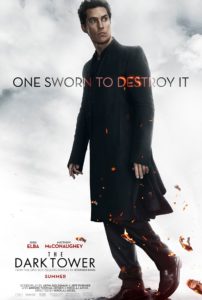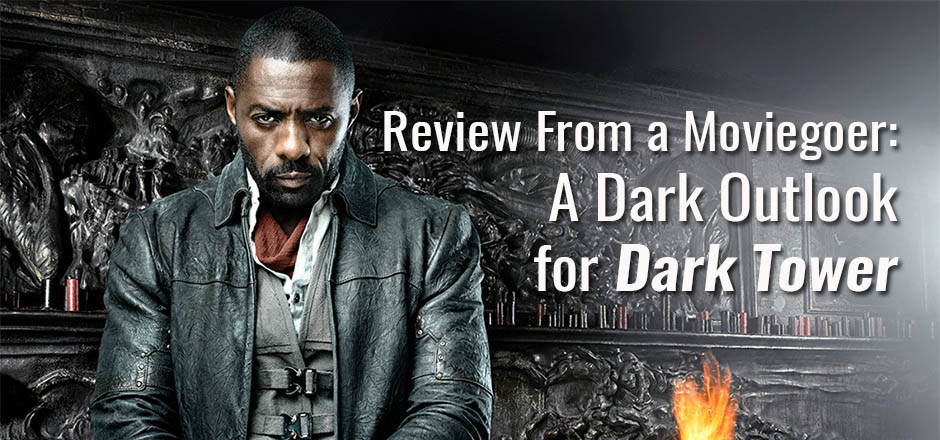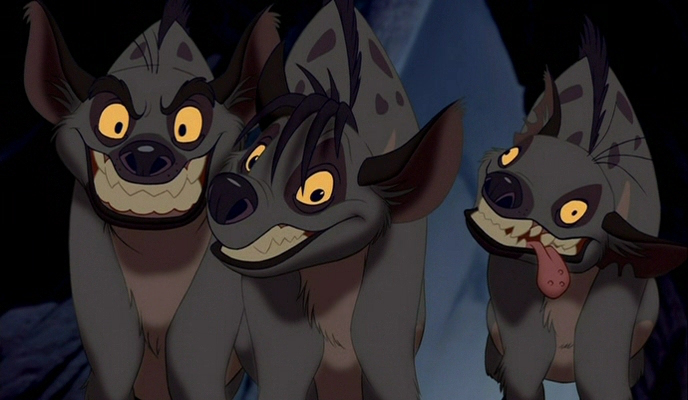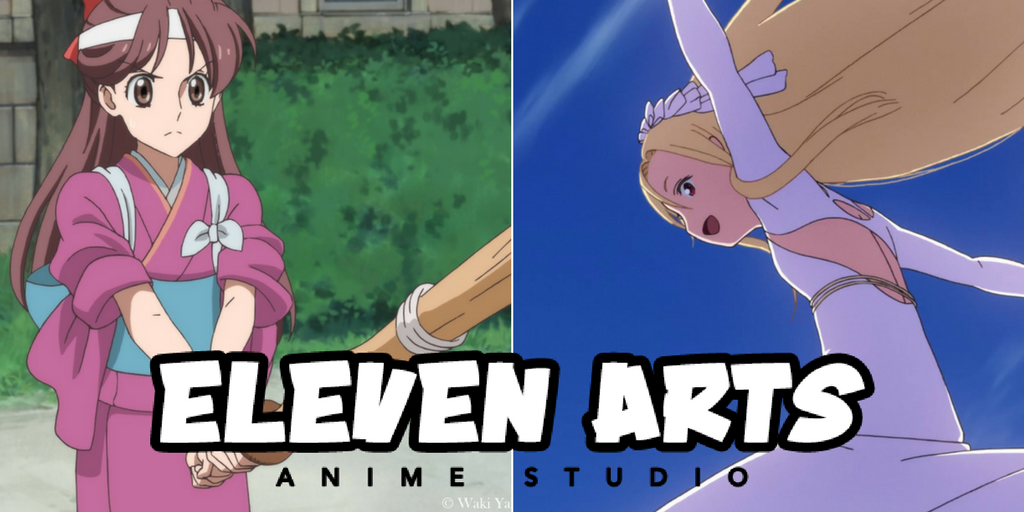From the mind of the modern master of horror, Stephen King’s Dark Tower hits theatres this month, and if there’s one thing this movie wants you to know, it’s that it is STEPHEN KING’S Dark Tower. You can play a pretty successful drinking game based on the number of other (better) King references in Nikolaj Arcel’s underwhelming action fantasy, which will almost certainly be forgotten amidst the otherwise stellar slate of films released in summer of 2017. With half-baked performances and a crippling need to explain itself, Dark Tower fails to find one clear and consistent voice, which is why it fails to grab hold of an audience the way so many King adaptations have done before.
The plot of Dark Tower is actually seven books’ worth of material boiled down into one 95 minute film. We are introduced first to Matthew McConaughey’s inspiringly bored Man in Black, who is the apparent CEO of a massive, parallel-world pyramid that uses the psychic energy of children to lay waste to the Dark Tower. This tower, we find out later, guards all the worlds of the universe against unspeakable demons beyond the borders of time and space. The Man in Black wants to do away with the tower to unleash the apocalypse, because… he will profit, somehow, I guess?
parallel-world pyramid that uses the psychic energy of children to lay waste to the Dark Tower. This tower, we find out later, guards all the worlds of the universe against unspeakable demons beyond the borders of time and space. The Man in Black wants to do away with the tower to unleash the apocalypse, because… he will profit, somehow, I guess?
Anyway, he finds the answer to his unholy prayers in Jake Chambers (Tom Taylor), a bullied boy who has psychic dreams of the war between the Man in Black and The Gunslinger Roland of Eld (Idris Elba). Jake breaks away from his unhappy life in NYC and stumbles into Mid-World, the plane of existence on which Roland and the Man in Black battle. Roland and Jake then team up to take down the Man’s evil forces, a quest which takes them through Roland’s desolate world and Jake’s, which can still, of course, be saved.
The story takes a lot of beatings from its so-so script, a complicated, crammed-in mythology, and the overall tired fantasy formula it tries to follow. While Tom Taylor does a nice job of looking like your typical strung-out, misfit preteen boy, he’s given extremely little to do besides looking sad where he’s supposed to and scared where he’s supposed to. Jake is presented as our protagonist, and yet he offers us zero likability, and even less originality. He simply reacts to the tsunami of confusing magical-steampunk jargon that gets thrown at him.
For example, Jake has a “Shine,” just like Danny Torrance (another, far more unsettling Stephen King child), but this kind of Shine can be tracked, and then turned into physical energy capable of destroying the universe. Yet part of what makes stories like The Shining so engaging is that these otherworldly things are best left un-probed, or at least minutely explained, so that the characters are forced to put action before answers. Instead, Dark Tower feels it necessary to shove in the fact that Roland has ties to Arthur of Eld, whoever that is, and therefore his guns are what actually inspired the tale of Excalibur on Earth. Make that “Keystone Earth,” rather, because there’s also a whole system of world-jumping portals and codes and other magical-tech that you can pretty safely tune out for.
Like Jupiter Ascending before it, Dark Tower takes a Chosen One narrative and a giant bucket full of ambitious ideas and churns out utter tedium. It’s like trying to take all the colors of the rainbow and mixing them in the hopes that you’ll get one singular, spectacular shade, and the result is inevitably mud.
The sad thing is, Dark Tower certainly could have said something, especially because the marginalized triumph over the people who hold all the power. The casting was refreshing for a major action picture, placing a man of color in the capable, compassionate, in-control leading role. True, it does give its only Asian actor (Claudia Kim) the two-dimensional part of Arra the mystic, who tells Jake all about his Shine just before he and Roland return to Earth, but it is refreshing to see scenes like the one in her village. People of all races mingle there peacefully, their only conflict being that they have few resources to survive. If only they weren’t literally massacred by the Man in Black’s minions.
Speaking of massacre, a big no-no here is the way women are treated in general. Arra is the woman most central to the plot, and she gives roughly six lines of explanation before she and her village are attacked. Tirana (Abby Lee Kershaw), an underling of McConaughey’s, has her face sliced open for no reason whatsoever. And worst of all, Jake’s mother (“Vikings” tour de force Kathryn Winnick) is never NOT on the verge of tears, and serves only as an emotional anchor for Jake. An emotional anchor that is destroyed, of course, when the Man in Black literally burns her alive. Necessary? Absolutely not. A waste of a great actress for shock value? You betcha.
One (mostly) positive note, however, is the almost hilarious difference between McConaughey’s performance and Idris Elba’s genuine, rough-and-tumble, too-old-for-this-sh*t Gunslinger. McConaughey seems confused every time he uses his “magicks,” which earned a laugh from me every time he said it, and his villain has no discernible motive, as he is neither gleeful nor dutiful about the chaos he attempts to bring about. That old “evil for evil’s sake” chestnut is dead on arrival these days.
Conversely, Elba gives us a hardy (although somewhat garbled) Gunslinger, who believes strongly in the ways of all gunslingers before him. He carries the shame of having previously let them down in every shot. His quest for revenge isn’t exactly convincing, but the unabashed bond between Roland and Jake comes through, thanks to Elba’s grizzled, grumbling kind of warmth.
In the end, Dark Tower’s overall message is far too broad to really hit home. To be honest, all the film has to offer is a basic “good versus evil” theme that somehow manages to make neither side look appealing. Our world is so much more complex than this story would have you believe. The lines between right and wrong seem to be blurred more and more each day – the things we accept as good and the things we reject as evil are fluctuating almost constantly, especially in the Information Age. A movie whose villain wants to destroy the universe for the hell of it strikes me as sinfully tone deaf.
It doesn’t matter how many times we see the number 1408 or the word Pennywise or a brief shot of a Rita Hayworth poster — all those references are smoke and mirrors, shoved in to make Dark Tower look like a labor of love, when really it is little more than a half-hearted effort that would’ve been much more successful on the SyFy channel. If you’re looking for a Stephen King fix, all I can say is that IT better deliver on September 8th.
[coffee]






